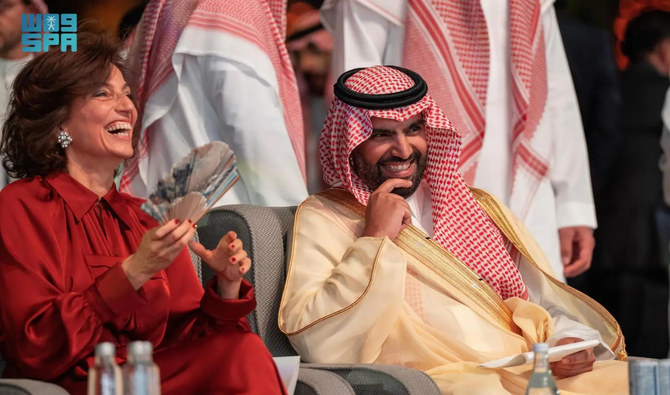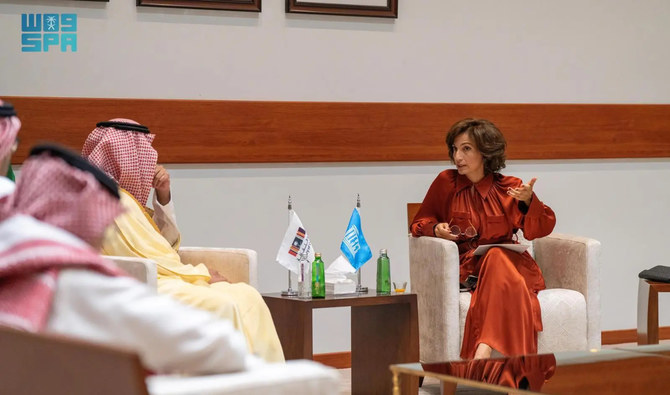RIYADH: People from around the world gathered for the first time in the Saudi capital to witness the launch of the 45th extended session of the UNESCO World Heritage Committee at Riyadh’s National Museum on Sunday.
During the session, more than 50 world sites are hoping to be included in the UN’s list of world heritage sites. The session is being chaired by Princess Haifa Al-Mogrin, Saudi Arabia’s permanent representative to UNESCO, and is scheduled to conclude on Sept. 25.
Prince Badr bin Abdullah, Saudi minister of culture, inaugurated the session and stressed the Kingdom’s belief in the importance of heritage as a cultural treasure and a human and knowledge heritage.
He highlighted Saudi Arabia’s collaboration with UNESCO on heritage and antiquities programs, including a long-term strategy to support the preservation of global heritage sites through capacity-building initiatives for the next decade.
Prince Badr praised UNESCO and other organizations for preserving global natural and cultural heritage, as well as promoting education, culture and science for sustainable development goals.
He also announced the establishment of the Saudi UNESCO Fund with an aim to support related heritage preservation programs and projects across the globe.
Director General of UNESCO Audrey Azoulay said: “As Riyadh welcomes the world today, it is the world that will be the focus of our discussion, in all its beauty and fragility. We will be speaking of corals, of forests, of biodiversity, of the prehistory of indigenous peoples, of strategy for Africa, but also of memory in a new way — and we will do it here, in Riyadh, with all the voices of the world.”
The World Heritage List, maintained by UNESCO, includes sites that represent the cultural and natural diversity of the world. A yearly meeting is held to review and update the list, accept new applications and make edits. This process puts certain sites, such as Venice and Kyiv, at risk of losing their status as world heritage sites.
The list, currently consisting of 1,157 sites, is highly regarded by many countries as it serves as a major driver for tourism, funding and the conservation of these sites. The meeting in Riyadh could potentially designate six additional locations as “in danger,” adding to the existing 55 sites already on the watchlist.
Azoulay said: “We know what a powerful resource heritage can be — for peace, for ecosystems, for knowledge or our history in all its complexity, for a sustainable economy, for the ties that bind generations, and that bind diverse societies so powerfully, for dialogue, also, among nations and people.”
She also extended her gratitude to the Kingdom for hosting the session of the committee, which marks a historic first. The strategic location of the Kingdom, at the crossroads of the world, and its significant contributions to history, culture and creativity, serve as a driving force for the progress of the session.
Saudi Arabia is home to the historic site of Hegra in AlUla, listed as a UNESCO World Heritage Site. The Ministry of Culture has been working since 2018 to develop sustainable tourism, vocational training and scholarships as part of this partnership.
The logo of the 45th session is inspired by the rock engravings of the Nabataean culture found in Hegra.
The opening ceremony was concluded with a performance showcasing the evolution of civilization in the region, spanning from ancient times to the present day.
The opening scene was a tribute to the late Saudi archaeologist Prof. Abdulrahman Al-Ansary, who played a crucial role in developing the archaeology sector in the Kingdom. Emerging from the depths of the earth, he effortlessly brushes away the dust, unveiling the hidden tales of the world below.
The journey begins in the Stone Age, where petroglyphs created by a Thamoudian artist can still be found in the Hail region to this day. It then progresses to the rise of civilizations, with established trade routes and networks. One such civilization is the gilded Kingdom of THajj, located in the Eastern Province. Additionally, the Nabataean civilization is highlighted for its renowned trade, impressive architecture, and the famous incense route.
The act proceeds to acknowledge the enlightenment that came with the dissemination of knowledge, scientific advancements, poetry, and the influence of Islam. It is followed by a concise introduction to the diverse and intricate cultures found across the regions of Saudi Arabia.
The performance serves as a tribute to a land that has embraced a multitude of civilizations throughout history, resulting in the cultural richness it possesses today.
In her speech, the UNESCO chief expressed condolences to Morocco for the recent deadly earthquake, leaving more than 2,000 dead and thousands injured.
Azoulay said that UNESCO’s team is on site and ready to support Moroccan authorities. “Solidarity is central to UNESCO’s foundation, and international assistance is part of our mission.”
Prince Badr also foreshadowed the expectations of the highly anticipated Expo 2030, saying: “Under the theme ‘Together for a Foresighted Tomorrow,’ the Kingdom will share its story of unprecedented national transformation with various communities around the world at Riyadh Expo 2030, where my country will present an exceptional historic edition and an unprecedented global experience in the history of the expo, further achieving the goals of Vision 2030.”
With 130 organizations in dialogue, the UNESCO sessions will platform collaboration and sustainability in preserving global heritage sites and building common grounds, providing enablers, and uniting to build new paths to strong strategic partnerships.















































